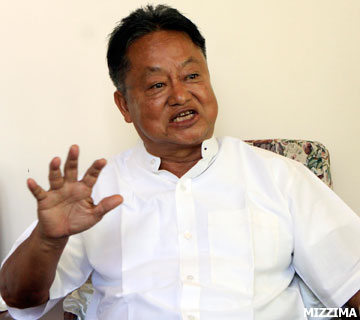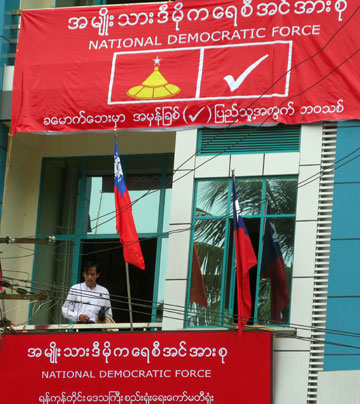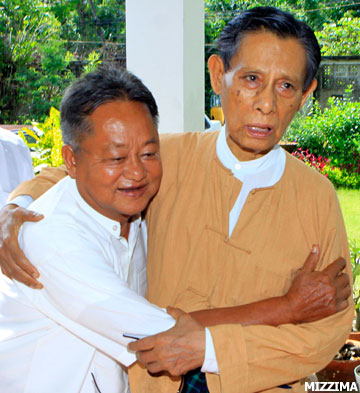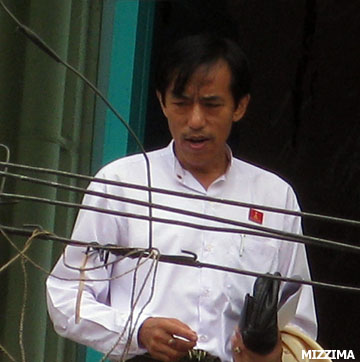Chiang Mai (Mizzima) – Politicians Khine Maung Yee and Win Htain claim they have been to hell and back. Both were jailed for political offenses. Both are now calling on Burma’s newly elected government to release their fellow political prisoners.
 Khine Maung Yee, 42, says he ‘gets dizzy’ trying to work out how to free the political prisoners in Burma’s jails. The National Democratic Force (NDF) senator says the prisoners are ‘in hell now’. The senator should know. He spent four years in prison from 1990 to 1994, has the torture scars to prove it and with an injured cornea can hardly see straight.
Khine Maung Yee, 42, says he ‘gets dizzy’ trying to work out how to free the political prisoners in Burma’s jails. The National Democratic Force (NDF) senator says the prisoners are ‘in hell now’. The senator should know. He spent four years in prison from 1990 to 1994, has the torture scars to prove it and with an injured cornea can hardly see straight.
Win Htain, 69, is a former soldier who is now a member of the National League for Democracy (NLD). He has spent even longer in jail, a total of 20 years, and remains a hounded man.
Both men understand the fear that haunts those who get involved in anything construed as illegal political activity in Burma. They know how easy it is to be arrested and imprisoned on the flimsiest of evidence.
As representatives of separate political parties, they are calling on the government of President Thein Sein to free the estimated 2,100 political prisoners currently held in Burmese prisons. Together with democracy activists, they signed a petition sent to the president on April 22 calling for the release of the prisoners.
In his presidential acceptance speech, President Thein Sein called for reconciliation but said nothing about releasing political prisoners, some of whom are serving 10 years to life imprisonment. In Burma, a life sentence can be as long as 110 years.
Politicians like Khine Maung Yee and Win Htain hope the election of a new government in Burma offers a chance to start afresh with the release of prisoners. But they are not holding their breath.
 Fear has long been used as a weapon by the military in Burma to clamp down on dissent or anything that remotely resembles criticism of the regime. Although a new government has been installed after the country went to the polls in November and the former ruling State Peace and Development Council under General Than Shwe has officially stepped down, there is little to indicate that this is anything more than a cosmetic change or that this will bring a stop to the systematic abuse of political prisoners.
Fear has long been used as a weapon by the military in Burma to clamp down on dissent or anything that remotely resembles criticism of the regime. Although a new government has been installed after the country went to the polls in November and the former ruling State Peace and Development Council under General Than Shwe has officially stepped down, there is little to indicate that this is anything more than a cosmetic change or that this will bring a stop to the systematic abuse of political prisoners.
Burma shares the dubious honor of ranking alongside North Korea, China and Iran as a country that abuses its political prisoners.
Khine Maung Yee and Win Htain understand what they are campaigning against having experienced prison brutality first-hand.
NDF Senator Khine Maung Yee told Mizzima that during the opening session of Parliament, there were many attempts to try to include the case of political prisoners for debate, but permission to discuss the issue was refused. The senator said he was upset that nobody could speak about this issue in Parliament.
The new government should have offered a general amnesty for the prisoners and for Burmese refugees living abroad, he said, adding, ‘If they say this is a multi-party democratic system, they need to offer freedom to every political prisoner for this to be a real system’.
Khine Maung Yee finds it painful to recollect what he went through in prison. He said he was initially arrested on September 22, 1989, in Pegu on what he said was a trumped up charge of trafficking in arms and in April 1990 given a seven-year sentence. He was 20.
When he was in Insein Prison during the 1990 election, he started a hunger strike to be allowed to listen to the radio and to read a newspaper. For his efforts, he was punished by being thrown into a dark cell.
When he was in Pegu Prison, he was tortured by being put on a wooden chair with his arms and legs tied to the chair for long periods of time. He said he was refused food for sometimes as long as a week and was forced to drink the water in his toilet in his tiny cell in order to survive.
 At one point, he considered committing suicide when he was suffering from cholera and the prison guards ignored his swelling stomach. But he was helped by his fellow prisoners.
At one point, he considered committing suicide when he was suffering from cholera and the prison guards ignored his swelling stomach. But he was helped by his fellow prisoners.
The prison guards showed no sympathy.
‘They tied me to a chair, put an electric bulb in front of my face and struck me with their fists’, he said, adding that one of his eyes was irreparably damaged.
When he was released from prison in April 1994, he said he struggled to readjust to normal life. He found he hated television, newspapers and interaction with people. He was unable to respond to people’s laughter. But he said over time he has overcome the bitterness in order to return to politics and press for the release of political prisoners.
Win Htain has endured longer periods of incarceration. Now almost 70, he has witnessed first-hand Ne Win’s ‘Burmese Way to Socialism’ and continued military rule. He recalls he joined the army back in 1959 and became a captain in 1963, the year after General Ne Win came to power in a coup. He said he wanted to be ‘an honorable person’ and so joined the army.
‘In my childhood, everyone around the country was friendly with the army, especially in my hometown. I lived at the junction of the road, and I usually saw soldiers passing on the road and I wanted to be like them and my patriotic mind was always alive. This led me to join the army’, he told Mizzima.
But by 1988, he said he had lost faith in the military and resigned his commission, and went to join the NLD. He was involved in Aung San Suu Kyi’s trip to upper and lower Burma to meet with the people in October.
At that time, he didn’t really know Aung San Suu Kyi, only that she was the daughter of General Aung San, Burma’s independence hero, and that she had just returned to Burma.
‘I didn’t know her qualifications. By the time she went to the districts and got in touch with the public, I found her speeches and decisions were so much better than I had guessed. She could be the best leader for the country and I decided to work with her’.
 At first, Win Htain said, he believed the promise of the military to hand over power to the winning party in the 1990 elections. But in due course he found out it was a lie. Although the NLD won the election, the military held onto power.
At first, Win Htain said, he believed the promise of the military to hand over power to the winning party in the 1990 elections. But in due course he found out it was a lie. Although the NLD won the election, the military held onto power.
He was arrested by the police on May 20, 1989, at the house of Aung San Suu Kyi for involvement in a wreath-laying ceremony for Suu Kyi’s father, Aung San, even though he did not go to the event.
After being released, he was arrested again and this time sentenced to a total of 14 years imprisonment for acting as a witness on behalf of the NLD for farmers who were challenging the government over a summer paddy growing project. The farmers had complained to Suu Kyi that they were being forced to plant rice when they wanted to plant peas.
After more than five years in prison, he was released in February 1995 and returned to work with the NLD. The government had been intensifying its arrests of politicians and a number were either imprisoned or put under house arrest.
In May 1996, he was arrested again for granting an interview to the Australian Broadcasting Corporation about the current situation of the NLD. He told the foreign news broadcaster that the government ‘arrests and oppresses the NLD like they cut the branches from the stem, step by step’. He was thrown back in prison.
For a moment, there was hope. Shaken by the ‘Saffron Revolution’ protest in 2007, the government offered an amnesty in 2008 for more than 9,200 prisoners, he said, but only 1 percent of those released were political prisoners. Win Htain was one of the few.
His relief was short-lived. After 17 hours of his release, he was arrested again after giving an interview to the BBC. He was jailed again. Then, after 10 months, he was released on July 15, 2010.
‘I gave an interview to the BBC because the situation of Burma was so shameful with the ‘88’ (1988) student leaders and monks sentenced to 20 years or 65 years’, he told Mizzima. ‘The oppression of democracy activists is something to be really ashamed about’.
Win Htain said he was badly treated during his periods in prison. In all, he spent time in five prisons. When he was in Insein Prison, he was locked up in a small, dark ‘VIP’ cell. He was only allowed out to meet visitors for 30 minutes twice a week. ‘This VIP cell really looked like hell’, he said.
In something of an understatement, he said this was an ‘undesirable system’. ‘During my experience of prison, two prisoners became mentally disordered, one tried to commit suicide and another one went mad’, he said.
He said that out of all the prisons, Myin Chan Prison, where he spent three years, was the worse for bad treatment. However, when he was in Mandalay Prison and reported the corruption of the jailers to the police, the jailers were arrested.
Although Win Htain was recently released from prison he remains a hounded man. Someone from the special police watches his house, he said. He is telephoned every day, during the day and at night, with questions, such as, ‘Are you back home? Where did you go today?’
The political activist said he hoped the new US special envoy to Burma, Derek Mitchell, will visit the country and that this would lead to the release of political prisoners.
Surprisingly, after all he has been through, he said he doesn’t hate the government.
Just like Khine Maung Yee, Win Htain said he wants to see an end to the oppression. They are two of a growing chorus of politicians and activists publicly calling on the new government for an amnesty.



